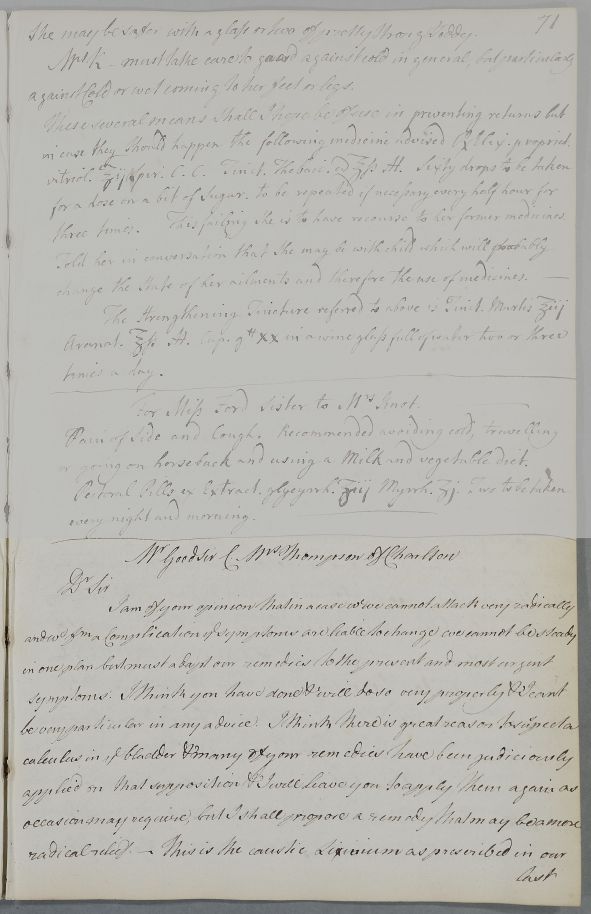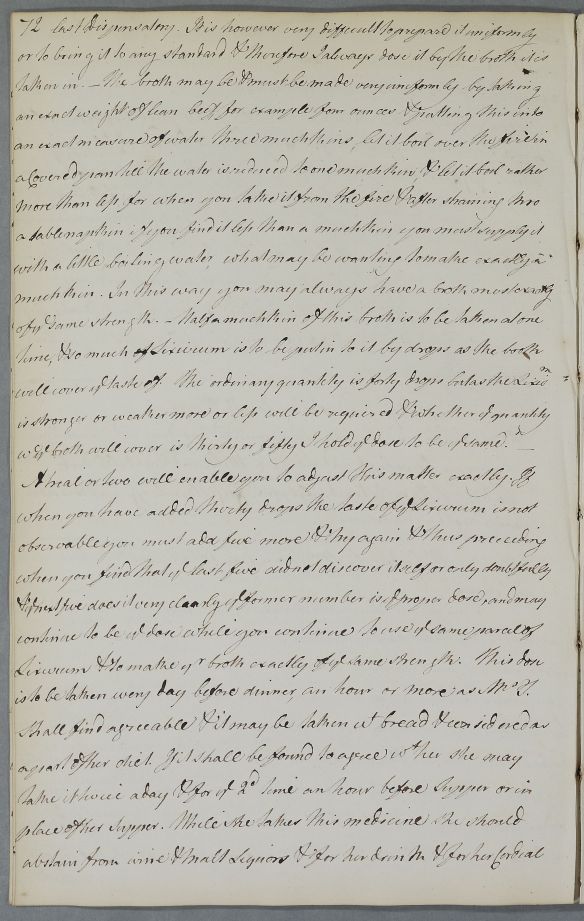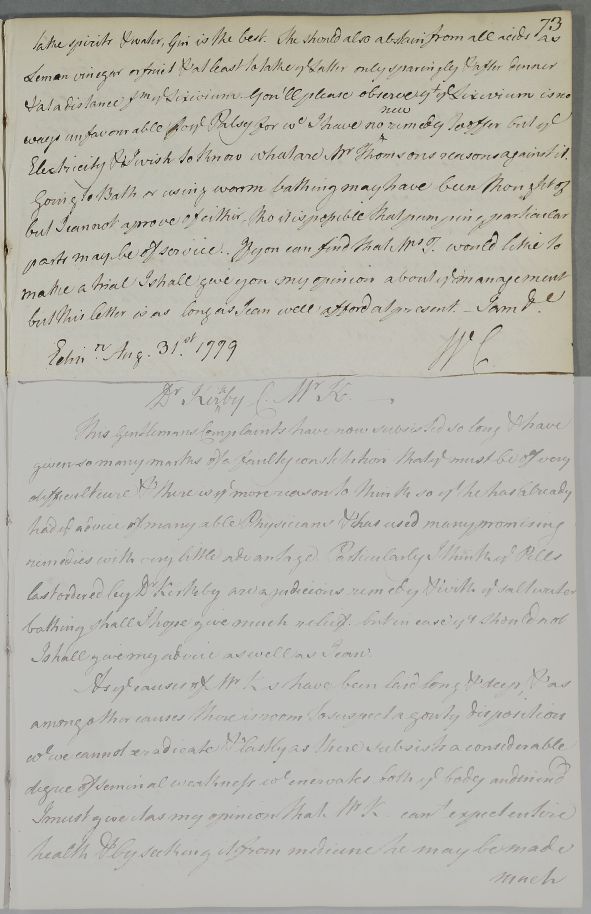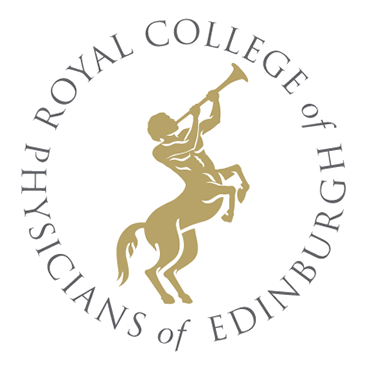
The Consultation Letters of Dr William Cullen (1710-1790) at the Royal College of Physicians of Edinburgh
[ID:4499] From: Dr William Cullen (Professor Cullen) / To: Dr David Goodsir / Regarding: Mrs Margaret Thomson (Paterson) (Thompson; of Charleton) (Patient) / 31 August 1779 / (Outgoing)
Reply to 'Mr Goodsir C[concerning]. Mrs Thompson of Charlton',. Cullen says 'I think there is great reason to suspect a calculus in the bladder'. He provides advice on preparing dosage of Lixivium in beef broth. He advises against going to Bath or warm bathing, and wishes to know what Mr Thomson's objections are to the use of electricity in treating his wife's paralytic symptoms.
- Facsimile
- Normalized Text
- Diplomatic Text
- Metadata
- Case
- People
- Places
Facsimile
There are 3 images for this document.

[Page 1]

[Page 2]

[Page 3]
Metadata
| Field | Data |
|---|---|
| DOC ID | 4499 |
| RCPE Catalogue Number | CUL/1/1/12/66 |
| Main Language | English |
| Document Direction | Outgoing |
| Date | 31 August 1779 |
| Annotation | None |
| Type | Scribal copy ( includes Casebook Entry) |
| Enclosure(s) | No enclosure(s) |
| Autopsy | No |
| Recipe | No |
| Regimen | No |
| Letter of Introduction | No |
| Case Note | No |
| Summary | Reply to 'Mr Goodsir C[concerning]. Mrs Thompson of Charlton',. Cullen says 'I think there is great reason to suspect a calculus in the bladder'. He provides advice on preparing dosage of Lixivium in beef broth. He advises against going to Bath or warm bathing, and wishes to know what Mr Thomson's objections are to the use of electricity in treating his wife's paralytic symptoms. |
| Manuscript Incomplete? | No |
| Evidence of Commercial Posting | No |
Case
Cases that this document belongs to:
| Case ID | Description | Num Docs |
|---|---|---|
| [Case ID:555] |
Case of Mrs Thomson of Charlton who suffers from sleeplessness and abdominal pains described as hypochondriasis. She is later suspected of having bladder stones and has a paralysis in the arm. |
9 |
People linked to this document
| Person ID | Role in document | Person |
|---|---|---|
| [PERS ID:1] | Author | Dr William Cullen (Professor Cullen) |
| [PERS ID:1295] | Addressee | Dr David Goodsir |
| [PERS ID:831] | Patient | Mrs Margaret Thomson (Thompson; of Charleton) |
| [PERS ID:1] | Patient's Physician / Surgeon / Apothecary | Dr William Cullen (Professor Cullen) |
| [PERS ID:1295] | Patient's Physician / Surgeon / Apothecary | Dr David Goodsir |
| [PERS ID:2232] | Patient's Relative / Spouse / Friend | Mr John Thomson (Thompson; of Charleton) |
Places linked to this document
| Role in document | Specific Place | Settlements / Areas | Region | Country | Global Region | Confidence |
|---|---|---|---|---|---|---|
| Place of Writing | Cullen's House / Mint Close | Edinburgh | Edinburgh and East | Scotland | Europe | certain |
| Destination of Letter | Leven | Edinburgh and East | Scotland | Europe | inferred | |
| Mentioned / Other | Bath | South-West | England | Europe | certain | |
| Mentioned / Other | Charleton House | Colinsburgh | Edinburgh and East | Scotland | Europe | certain |
Normalized Text
Mr Goodsir concerning Mrs Thompson of Charlton
I am of your opinion that in a case which we cannot attack very radically
and which from a Complication the symptoms are liable to change, we cannot be steady
in one plan but must adapt our remedies to the present and most urgent
symptoms. I think you have done & will do so very properly & I cant
be very particular in any advice. I think there is great reason to suspect a
calculus in the bladder & many of your remedies have been judiciously
applied on that supposition & I will have you to apply them again as
occasions may require, but I shall prepare a remedy that may be a more
radical relief. This is the caustic Lixivium as prescribed in our
[Page 2]
last dispensatory. 1 It is however very difficult to prepare it uniformly
or to bring it to any standard & therefore I always dose it by the broth it is
taken in. –– The broth may be & must be made uniformly by taking
an exact weight of lean beef for example four ounces & putting this into
an exact measure of water three muchkins, let it boil over the fire in
a covered pan till the water is reduced to one muchkin, & let it boil rather
more than less for when you take it from the fire & after straining thro
a table napkin if you find it less than a muchkin you may supply it
with a little boiling water, what may be wanting to make exactly a
muchkin. In this way you may always have a broth most exactly
of the same strength. – Half a muchkin of this broth is to be taken at one
time, & so much of Lixivium is to be put in to it by drops as the broth
will cover the taste of. The ordinary quantity is forty drops but as the Lixivium
is stronger or weaker more or less will be required & whether the quantity
which the broth will cover is thirty or fifty I hold the dose to be the same. ––
A trial or two will enable you to adjust this matter exactly. If
when you have added thirty drops the taste of the Lixivium is not
observable you must add five more & try again & thus preceeding
when you find that the last five did not discover itself or only doubtfully
& the next five does it very clearly the former number is the proper dose, and may
continue to be the dose while you continue to use the same parcel of
Lixivium & to make your broth exactly of the same strength. This dose
is to be taken every day before dinner, an hour or more as Mrs T.
shall find agreeable & it may be taken with bread & considered as
a part of her diet. If it shall be found to agree with her she may
take it twice a day & for the 2d time an hour before supper or in
place of her supper. While she takes this medicine she should
abstain from wine & malt Liquors & for her drink & for her Cordial
[Page 3]
take spirits & water, Gin is the best. She should also abstain from all acids as
Lemon vinegar or fruit & at least to take the Latter only sparingly & after dinner
& at a distance from the Lixivium. You'll please observe that the Lixivium is no
ways unfavourable for the Palsy for which I have no ↑new↑ remedy to offer but the
Electricity & I wish to know what are Mr Thomsons reasons against it.
Going to Bath or using warm bathing may have been thought of
but I cannot aprove of either, tho it is possible that pumping particular
parts may be of service. If you can find that Mr T. would like to
make a trial I shall give you my opinion about the management
but this letter is as long as I can well afford at present. – I am &.c
Notes:
1: See Pharmacopoeia Collegii Regii Medicorum Edinburgensis (Edinburgh: 1774), pp. 117-118.
Diplomatic Text
Mr Goodsir C. Mrs Thompson of Charlton
I am of your opinion that in a case wc we cannot attack very radically
and wc fm a Complication ye symptoms are liable to change, we cannot be steady
in one plan but must adapt our remedies to the present and most urgent
symptoms. I think you have done & will do so very properly & I cant
be very particular in any advice. I think there is great reason to suspect a
calculus in ye bladder & many of your remedies have been judiciously
applied on that supposition & I will have you to apply them again as
occasions may require, but I shall prepare a remedy that may be a more
radical relief. This is the caustic Lixivium as prescribed in our
[Page 2]
last dispensatory. 1 It is however very difficult to prepare it uniformly
or to bring it to any standard & therefore I always dose it by the broth it is
taken in. –– The broth may be & must be made uniformly by taking
an exact weight of lean beef for example four ounces & putting this into
an exact measure of water three muchkins, let it boil over the fire in
a covered pan till the water is reduced to one muchkin, & let it boil rather
more than less for when you take it from the fire & after straining thro
a table napkin if you find it less than a muchkin you may supply it
with a little boiling water, what may be wanting to make exactly a
muchkin. In this way you may always have a broth most exactly
of ye same strength. – Half a muchkin of this broth is to be taken at one
time, & so much of Lixivium is to be put in to it by drops as the broth
will cover ye taste of. The ordinary quantity is forty drops but as the Lixivm
is stronger or weaker more or less will be required & whether ye quantity
wc ye broth will cover is thirty or fifty I hold ye dose to be ye same. ––
A trial or two will enable you to adjust this matter exactly. If
when you have added thirty drops the taste of ye Lixivium is not
observable you must add five more & try again & thus preceeding
when you find that ye last five did not discover itself or only doubtfully
& ye next five does it very clearly ye former number is ye proper dose, and may
continue to be ye dose while you continue to use ye same parcel of
Lixivium & to make yr broth exactly of ye same strength. This dose
is to be taken every day before dinner, an hour or more as Mrs T.
shall find agreeable & it may be taken wt bread & considered as
a part of her diet. If it shall be found to agree wt her she may
take it twice a day & for ye 2d time an hour before supper or in
place of her supper. While she takes this medicine she should
abstain from wine & malt Liquors & for her drink & for her Cordial
[Page 3]
take spirits & water, Gin is the best. She should also abstain from all acids as
Lemon vinegar or fruit & at least to take ye Latter only sparingly & after dinner
& at a distance fm ye Lixivium. You'll please observe yt ye Lixivium is no
ways unfavourable for ye Palsy for wc I have no ↑new↑ remedy to offer but ye
Electricity & I wish to know what are Mr Thomsons reasons against it.
Going to Bath or using warm bathing may have been thought of
but I cannot aprove of either, tho it is possible that pumping particular
parts may be of service. If you can find that Mr T. would like to
make a trial I shall give you my opinion about ye management
but this letter is as long as I can well afford at present. – I am &.c
Notes:
1: See Pharmacopoeia Collegii Regii Medicorum Edinburgensis (Edinburgh: 1774), pp. 117-118.
XML
XML file not yet available.
Feedback
Send us specfic feeback about this document [DOC ID:4499]
Please note that the Cullen Project team have now disbanded but your comments will be logged in our system and we will look at them one day...


